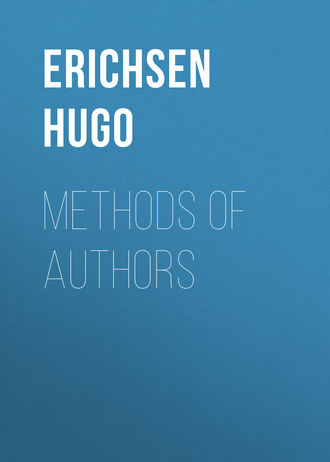 полная версия
полная версияMethods of Authors
"For breakfast the simplest food is the best. I begin with oyster stew, then some cold chicken, next a few small lamb chops and mashed potatoes, after that a good-sized beefsteak and fried potatoes, then a rasher of bacon with fried eggs (three), followed by a whitefish or two, the meal being completed with some light, wholesome pastry, mince pie for preference. Care should be taken to avoid tea or coffee, and I think a word of warning ought to go forth against milk. The devastation that milk has wrought among literary men is fearful to contemplate. They begin, thinking that if they find it is hurting them, they can break off, but too often before they awaken to their danger the habit has mastered them. I avoid anything at breakfast except a large tumbler of brandy, with a little soda water added to give it warmth and strength.
"No subject is of more importance to the literary aspirant than the dividing of the hours of work. I divide the hours just as minutely as I can, and then take as few of the particles as possible. I owe much of my success in life to the fact that I never allow work to interfere with the sacred time between breakfast and dinner. That is devoted to rest and thought. Much comfort can be realized during these hours by thinking what a stir you would make in the literary world if you could hire a man like Howells for five dollars a week to do your work for you. Such help, I find, is very difficult to obtain, and yet some people hold that the labor market is overcrowded. The great task of the forenoon should be preparation for the mid-day meal. The thorough enjoyment of this meal has much to do with a man's success in this life.
"Of course, I do not insist that a person should live like a hermit. Because he breakfasts frugally, that is no reason why he should not dine sumptuously. Some people dine at six and merely lunch at noon. Others have their principal meal in the middle of the day, and have a light supper. There is such merit in both these plans that I have adopted both. I take a big dinner and a light lunch at noon, and a heavy dinner and a simple supper in the evening. A person whose brain is constantly worried about how he can shove off his work on somebody else has to have a substantial diet. The bill of fare for dinner should include everything that abounds in the market – that the literary man can get trusted for.
"After a good rest when dinner is over, remain quiet until supper-time, so that the brain will not be too much agitated for the trials that come after that meal.
"I am a great believer in the old adage of 'early to bed.' We are apt to slight the wisdom of our forefathers; but they knew what they were about when they advised early hours. I always get to bed early, – say two or three in the morning. I do not believe in night work. It is rarely of a good quality. The brain is wearied with the exertions of the day and should not be overtaxed. Besides, the time can be put in with less irksomeness at the theatre, or in company with a lot of congenial companions who avoid the stimulating effects of tea, coffee, and milk. Tobacco, if used at all, should be sparingly indulged in. I never allow myself more than a dozen cigars a day; although, of course, I supplement this with a pipe.
"When do I do my literary work? Why, next day, of course."

